Meilin Scanish DC/Paris
September
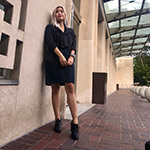
Me outside the Brookings
Office in Dupont
This semester, I’ll be participating in Notre Dame’s Washington Program with the Rooney Center for the Study of American Democracy. Through this program, students are afforded the opportunity to work an internship for academic credit while also taking classes in the evenings. I’ll be doing this domestic program in the fall and then going abroad to Paris in the spring, and I’m both excited and nervous to spend the entire year away from Notre Dame’s campus. Still, while I’ll miss my friends at school, I couldn’t resist the opportunity that the Washington program offered. With its rich history in foreign affairs and status as the headquarters of many international organizations, Notre Dame’s Washington DC internship program be paramount to my future plans. Given my interest in studying human rights law from a historical perspective, the Washington DC program will provide the necessary curriculum of current events and global history to build upon my established foundation of history and peace studies education from Notre Dame. I am already considering senior thesis topics that would tie together history and peace studies, and, given DC’s key historical role in international relations, I know this would make an excellent location to begin research.
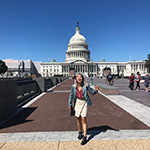
At the Capitol Building
The internship I got for my semester is one as a research assistant at the Brookings Institution in their Governance Studies Department. During my internship at the Brookings Institution, I’d like to learn what it like working in research on a daily basis. I’ve done short-term or semester-long research projects for my various classes, but I have never devoted myself to a single, in-depth project for such a lengthy duration. I’ve been considering academia as a potential career path, and so the opportunity to intern at a think tank will be an exciting prospect to see what political research looks like in practice. Additionally, I’d like to get comfortable working in a professional environment and gain the respect of my coworkers. I’ve worked some short internships before, but usually just for the summer and usually for only a few days a week. I’ve never made this kind of time commitment to an internship before, and I’m looking forward to getting to know people and establishing a regular routine. I hope I’ll be able to help the people at the Brookings Institution in a legitimate and worthwhile way.
On a typical day, I work on a project or assignment that I’ve been working on for at least several days already. There aren’t really any “small” tasks that can get done in a single day; they’re all things that require a more long-term time commitment. So far, I’ve spent all of my time editing a single 80-page report on backsliding democracies in Central and Eastern Europe that’s due to come out this November. I normally select a particular section to focus on for that day, and I try to get all of the proofreading, fact-checking, and citations completed for that section before moving on to the next one. Sometimes, I’ll go to Brookings public events, especially if the event covers a topic that my department is interested in. If this is the case, my supervisor will send me to go take notes and report back what happened, and how it relates to one of our research projects.
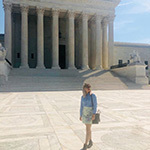
At the Supreme Court
So far, I like my internship. The topics we are researching – democratization in Central and Eastern Europe after the fall of the USSR, the role of the Consumer Finance Protection Bureau in the aftermath of the 2008 financial crisis, and transparency and anticorruption in the extractive industry – are all of interest to me. I also really appreciate the opportunity to attend Brookings events whenever I’m not busy. The other day, I got to go to a joint Brookings-AEI event on a proposed bipartisan bill in the Senate covering paid family leave, and yesterday, I attended a panel of Brookings scholars to discuss the impeachment inquiry just opened against President Trump. Most importantly, though, I appreciate the ability to contribute what I feel is substantive research, even if it can be boring at times. I get to read and write all day, which are two things that I love to do.
October
This October has been busy. I took a six-hour long midterm, visited the White House, attended a Senate hearing, got lunch with an ND alum in the field I’m considering going to, finished training for the volunteer position I’m working with Metropolitan Police Department, and got approval for a small research project of my own at Brookings.
The six-hour midterm, as unpleasant as it was to sit down and complete, was a good experience in timed memo-writing, something I’ve never had the opportunity to do before in my coursework. As a history major, the only kind of writing I’ve ever really done is for academic research papers. In the more politics-oriented classes I’ve taken through the Washington Program, I’ve had the opportunity to dabble in other forms of writing composition – so far, I’ve done policy memos, event briefings, op-eds, and interviews. It’s been nice learning different styles of writing employed in the political field, though I do somewhat miss traditional historical research
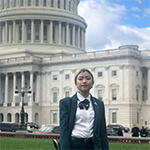
My visits to the Senate and the White House were arranged through the Public Policy and Law seminar I’m taking. The hearing at the Senate Committee on Banking, Housing, and Urban Affairs on the Consumer Finance Protection Bureau’s semi-annual report was arguably more educational (especially as one of the projects I’ve been assisting with my internship has been on the CFPB), but the White House visit was more fun. The White House tour didn’t let visitors see much – just a few historic rooms of the East Wing where the President hosts fancy events – but it was undeniably cool just getting to be inside the White House.
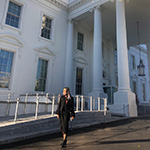
On one of the previous visits with the Public Policy seminar, we visited an immigration law clinic to speak with a former Notre Dame student and Washington Program alum. During our visit, she discussed her background as a Peace Studies major and how that informed her decision to pursue a JD in international human rights law. As a fellow Peace Studies major interested in pursuing a JD in international human rights law, I reached out to her to meet again for lunch to talk about her work and career trajectory. I was a little nervous to meet with her one-on-one at first, but she was very friendly – in many ways, it felt more like a casual discussion between an alum and a current student who happened to meet at a tailgate, than it felt like a networking interview.
In addition to my class-related activities, I’ve started volunteering with the DC Metropolitan Police Department’s Domestic Violence Liaison Program. In this position, I ride along with patrol officers to respond to 911 calls to provide victims of domestic violence with resources and information about obtaining civil protection orders, applying for a free lock change and potentially leaving their home to stay in a shelter. As much as I enjoy my internship at Brookings and the research I get to do, it can be kind-of isolating sitting at a computer all day, and I really wanted something to do that incorporated more direct service and human interaction. I spent all month shadowing other volunteers and attending training sessions with victim advocates, social workers, and police officers, and I’m now ready to start working on my own as a liaison.
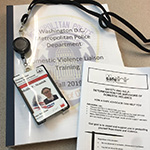
Finally, I’ve been working on a small independent research project alongside the senior fellow whose supervision I’ve been under at Brookings. After I’d finished up my summer internship in Rome, I traveled to Budapest very briefly to visit a friend studying for his Master’s in history. While I was there visiting him, I came across a little park called Freedom Square, an eclectic patchwork of memorials and monuments to contemporary Hungarian history, including, among others, works dedicated to the Red Army, Ronald Reagan, the victims of Nazi occupation, and, until recently, Imre Nagy. This – the decision earlier this year to relocate Imre Nagy, a leader in the failed 1956 Hungarian Revolution against the Soviet Union, to a less central location – is what I’ll be centering the piece around, using it to illustrate the broader phenomenon of Prime Minister Viktor Orbán’s attempts to restructure the narrative of Hungary’s national character. My hope is to get the project published as a blog on Brookings’s website once it’s complete, as a recent change in Brookings’s authorship policy now allows interns to co-author short pieces with fellows or with research staff. It’s all in very early stages right now, so we’ll see where that goes.
November
Here at the end of my semester in Washington, I’ve had a lot of time to reflect on the highs and lows of the program. What I enjoyed most about my internship at Brookings was the diversity of topics I was able to do research on – each day was truly unique, as I never knew if I'd be helping to run a panel on strategies to resist democratic backsliding or doing archival research into old immigration records from the 1940s or taking notes at a pre-departure meeting for a trip to Peru to study mining regulations and oversight. As a history major, it was really rewarding being able to utilize the skills in research and argumentation that I've picked up over the last two and a half years in class in a real professional environment.
Still, though I liked my internship, I definitely did not love every minute of it. I’d originally opted to intern at a think tank because I hoped it would form the perfect balance between direct involvement with policy and academic research, but ultimately, I think I’d rather focus on either one or the other. I’d still consider working in a think tank one day, but it would have to be after I’d spent some time in a more fieldwork-oriented position. As entry-level positions go, I don’t think being a research assistant is for me; I’d rather go to graduate school and focus on own original work. I do still very much enjoy research, and the best part of my job was that I felt like I did substantive work almost every day. It may have been somewhat stifling sitting at a cubicle and looking at my laptop screen all day, but at least I got to work on projects that interested me and that actually challenged my skill sets.
The most exciting part of my internship was getting to work on my own small piece of independent research on historical revisionism in Hungary that I finally got published on the Brookings website as a blog post. It felt like I was in the editorial stages for ages, but, shortly before Thanksgiving, it finally went live online.
I think just as exciting as getting the post published was reading the reactions to it, mostly from my friends and family, but also from outsiders as well. For instance, I didn’t mean for my article to aggravate the Hungarian government. Or rather, I did – I wanted my piece on historical revisionism in the Viktor Orbán regime to be provocatively critical – but I didn’t expect an email from the Hungarian Embassy requesting space on the Brookings Institute’s website to “respond.”
I hadn’t even expected when I began my internship to be able to co-author and publish my own research at all – but, as I was pleasantly surprised to learn, there was a new authorship policy that begin with the class before mine to allow interns their own bylines in website posts.
Choosing the topic was easy: I had recently visited Budapest, where I discovered Freedom Square, an eclectic collection of memorials to recent Hungarian history. I also discovered, in talking with local students, the recent illiberal political changes they had witnessed – including the decision to remove the statue of a martyred democracy advocate from its place in Freedom Square that seemed reflective of an overarching attempt to change Hungary’s historical narrative.
The next step, convincing a senior fellow to be my co-author, was more difficult. The scholar I chose, Norm Eisen, former Ambassador to the Czech Republic, was very busy – though he was genuinely helpful, my project was not a top priority. But it was mine. If I wanted my essay to be published, I had to take the initiative to see it through to completion. I devoted my spare time to scouring the Hungarian news and assembling my article – I had a story to tell, one I hoped would alert of the dangers of historical revisionism and illiberalism. After countless rounds of factchecking and edits from Norm, my article finally went up on the Brookings website – with my name first in the byline.
Not a day later, we received the email from the Hungarian Embassy to dispute my criticisms – and I can’t think of a higher compliment. That Orbán’s far-right government would want to respond means I’ve struck a nerve. I hope that, for as long as it is necessary to preserve democracies, my work will continue to do so.
January 2020
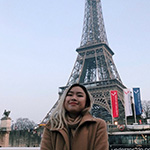
With the Eiffel Tower during a
Sciences Po Welcome Programme
-sponsored boat tour.
If, traditionally, English is the language of trade and German the language of science, French is the language of diplomacy. It is for this definition of French that I decided to attend l’Institut des études politiques de Paris (or, as it’s better known, Sciences Po Paris) for my semester abroad – as a History and International Peace Studies major with aspirations of going into international law and diplomacy, Sciences Po, and by extension, France, will be paramount to my future plans. With my interest in studying human rights law from a historical perspective, Sciences Po will provide the necessary curriculum of political and global history to build upon my established educational foundations from Notre Dame. I am already considering senior thesis topics that would tie together history and peace studies, and, given France’s key historical role in international relations, I know Paris will make an excellent location to begin my research.
Furthermore, if I intend to one day secure a position at one of the many international organizations, such as the UN or EU, for which French is a procedural language, I need to improve my French. At Sciences Po, I am taking advantage of not only the rigorous coursework but also the immersive experience in a Francophone country, working towards my goal of proficient French for international law. With over five years of experience in French language courses, this immersion will hopefully be key to my advancement in French, providing me with the tools to effectively continue my studies after the experience ends.
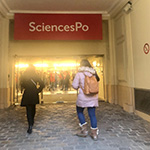
From my first day of class.
The Sciences Po Exchange Programme forms a natural sequence with the Washington DC internship I completed just a semester ago through the University of California. This time last year, when I was debating which off-campus programs I should or shouldn’t take part in, I wasn’t certain if it was a good idea to spend the whole year away from Notre Dame in order to do both Washington DC and Paris. There was a whole week in mid-January 2019 where I think I went into the Notre Dame International office in the Main Building just about every day to discuss my options with my advisor. Now that I’ve completed DC and the first month of Paris, though, I’m so glad that I opted for both. DC was an excellent introduction to independent life in a big city, and working a 9-5 research internship at Brookings prepared me well for Sciences Po’s rigorous curriculum of politics and international relations. These programs form a logical progression: after my practical immersion in American political life in DC, Paris will allow me to expand upon my studies and deepen my understanding of current political affairs and foreign policy from a more global perspective. I couldn’t recommend the combination of the two programs more.
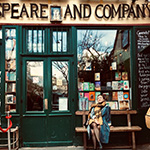
Outside the famous Shakespeare
and Company bookstore.
As the #4 undergraduate program in the world for politics and international relations, I thought Sciences Po could make for a rigorous but enlightening semester, and so far, it’s lived up to those expectations. I wanted somewhere to study abroad where I could be a real exchange student at a foreign university, rather than some of the other study abroad programs that Notre Dame offers where you live and take classes at a Notre Dame campus surrounded by Notre Dame students and professors. Here in Paris, I live in my own apartment, and I’m just one of five other Notre Dame exchange students among 4,000 Sciences Po students, most of whom are French. It’s been overwhelming at times, but in a good way. I do still feel a little “domesick” for campus and my friends there, but I think it will all be worth it in the end to attend such a prestigious university in a country that I’ve wanted to visit for years.
Though the icon of the French diplomat in his 18th century wig and cravat remains in the public consciousness today, the ranks of great French diplomats have expanded to include more diverse peoples than ever before. By combining my interests in history and international relations with Sciences Po’s curriculum, I hope to learn from this new class of French diplomats, perhaps even becoming like them myself one day.